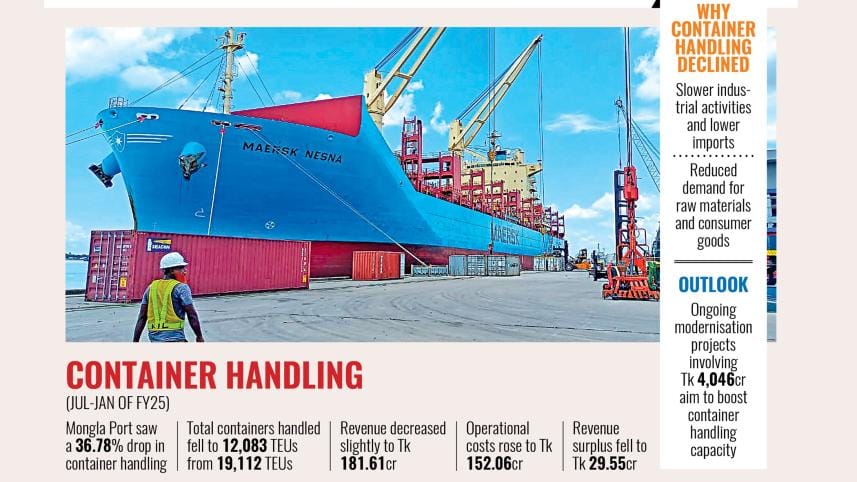Economic slowdown lowers container handling at Mongla port

Mongla port, the second largest seaport in Bangladesh, witnessed a sharp decline in container handling throughout the first seven months of the current fiscal year (FY), with growing economic constraints eroding business activities in the country.
Official data shows that the seaport handled around 12,083 twenty-foot equivalent units (TEUs) of containers in the July-January period of FY25, down 36.78 percent year-on-year.
The decline was worst in January, when container handling receded by 42.02 percent year-on-year to 1,697 TEUs, reflecting lower imports amid a sluggish domestic economy.
Khayrul Bashar, CEO of local cargo service provider Fleet Freight, said the decline in container handling is a result of the country's slowing industrial output.
He said local businesses are being cautious about foreign purchases amid the ongoing currency volatility and rising inflation, resulting in lower shipments of industrial raw materials and other key imports.
"Many businesses are cutting back on imports due to rising costs and tighter financial conditions," Bashar added while citing reduced shipments of bulk cargo and consumer goods through Mongla port.
He further said that this reflects the country's broader economic slowdown as lower imports of industrial inputs and intermediate goods is affecting the import-reliant industries.
Bashar also informed that just 250 of roughly 700 clearing and forwarding agents enlisted by the port are currently active.
"Higher import costs and lower industrial demand contributed to this decline," he said while highlighting challenges faced by the port in attracting major shipping lines and handling higher trade volumes.
AKM Anisur Rahman, member (engineering and development) of Mongla Port Authority, said container handling has fallen compared to previous levels because of economic challenges both home and abroad, including disruptions to the global supply chain.
Rahman explained that container traffic could also fluctuate amid shifting market trends, geopolitical uncertainties and changes to import-export behaviour based on the peoples' seasonal needs.
As such, he assured that such downturns are temporary, and that upcoming infrastructure projects would enhance the port's handling capacity.
Regarding a recently approved project for enhancing the facilities at Mongla Port, Rahman said the plans include constructing new jetties and upgrading its ICT with the aim of attracting more foreign ships through improved efficiency.
More specifically, the Tk 4,046 crore project will enhance the port's container-handling capacity by establishing more modern facilities, which includes a new container terminal, container delivery yard, and container stockyard.
Regarding the decline in container handling in January, Rahman expressed optimism that the volume would recover in the coming months, when the trade activities stabilise.
Moreover, Rahman said the port authority is focusing on long-term solutions to strengthen Mongla's position in the maritime trade sector.
And despite the recent decline, he remains hopeful that ongoing infrastructure projects, including those for improving road and rail links, will help Mongla port regain its momentum in coming months.
However, Rahman said much will depend on the global economic recovery and government initiatives to bolster trade and logistics efficiency.




 For all latest news, follow The Daily Star's Google News channel.
For all latest news, follow The Daily Star's Google News channel.
Comments